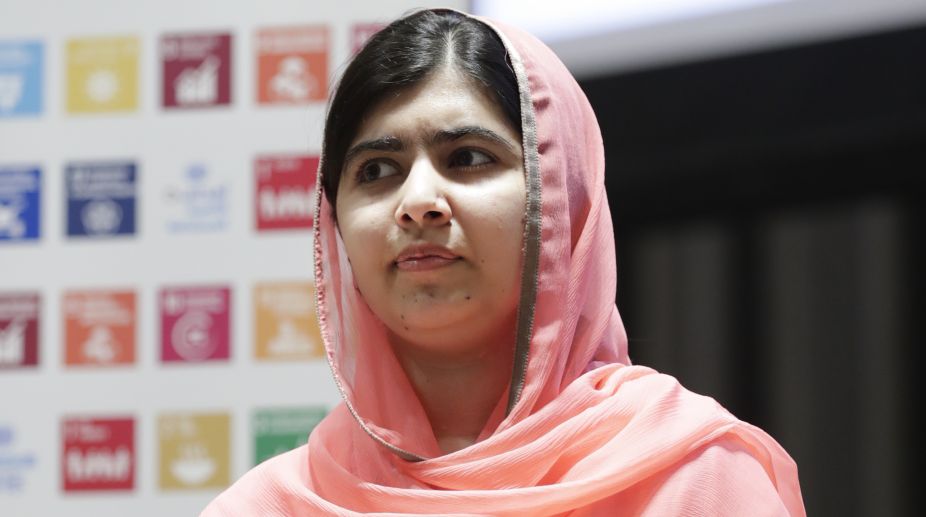Corporates should come forward to support the cause of girl education in India and other countries by utilising the financial, technical and human resources available with them, Pakistani activist Malala Yousafzai has said.
Overwhelmed by the “love and support” she has been getting from Indians, she is also keen to visit India to meet businessmen, activists and political leaders in the country, who want to work on helping educate and empower girls.
Advertisement
Malala, who was here to attend the World Economic Forum (WEF) Annual Meeting last week, met a number of government and business leaders from across the world and said many of them expressed their commitment in joining hands with her to help send the girls who have not been able to go to school.
The 20-year-old, who was shot at by Taliban at the age of 15 for defying the ban on girls going to school and went on to get a Nobel Peace Prize and become the UN Messenger of Peace, said she is a big fan of India and wants to learn more about the country’s culture and values.
She has co-founded Malala Fund that seeks to invest in girl education across the world, while one of its initiatives Gulmakai Network – named on Malala’s pen name that she used while writing blogs against Taliban regime – supports the work of education champions across the world.
Malala said she is very keen on expanding to India this Gulmakai Network, which seeks to engage with locals in every country who are keen to work on its cause.
In an interview, Malala told PTI she got a lot of support from leaders and civil society members present at WEF and she gave a message to the government leaders that they should increase their funding for girl education.
“There is a lack of funding and it is actually declining and it is really unfortunate that rather than seeing a positive increase in funding for education, it is declining.
“This is shocking and alarming and we have to push the governments to increase the funding for education,” she said.
Malala, who also met Canadian Prime Minister Justin Trudeau, said she was happy that Canada has announced support for global partnership for education.
“I hope that in coming months at G7 and G20 meetings, all the developed countries will increase their support towards girl education and women empowerment.
“I have heard many people saying that these summits have no outcome but I think this year at least they are giving more attention towards women and their education and empowerment,” she said.
Malala said she is seeing a positive change and it may take a while in terms of businesses and corporates, but they have the resources and technology and all the things that are needed.
“We need to think how we can encourage them to invest in education. These big companies have amazing people and all the technical resources as well. They have done research and they have the data and we must think how can we use them and get their support and encourage them to invest in girl education.
“I have had good meetings here (at WEF) and I am hopeful that we can build up on this group of corporates, activists and NGOs, as well as government leaders who can come together and say education is our priority and we will invest in future generation,” she said.
Malala exhorted them to commit that they will give the girls quality and safe education.
“These are the people who are making decisions on future generations and about eliminating poverty and improving health but how is that even possible if we ignore millions of girls who cannot even go to schools.
“No plans will work unless you invest in girl education,” she said.
Asked about her views on the ‘Beti Bachao, Beti Padhao’ scheme in India and some corporates investing their CSR (Corporate Social Responsibility) funds in girl education in the country, Malala said these are good initiatives and other governments should also introduce such campaigns.
“They all need to work to help improve quality of life, health and education for girls,” she said.
Appreciating those working hard in India for such issues, Malala said there are local activists in various countries who are doing this work and she wants to connect with them through her Gulmakai Network.
“We need to find how can we use technology to improve access to education. I am talking to local leaders as they know problems and can think of solutions at local levels.
“So we are expanding our Gulmakai Network to India as well as to Latin America. I am really excited for our work in India and I hope that all businesses and corporates and local leaders who are out there, will join hands in this and we will work together for quality education of every child,” she said.
In her message to “all young girls in India”, Malala said they should believe in themselves, focus on education and get quality education and should stand up to bring the change in their country.
“That’s their country, their villages and they have to shape them up. They should come forward to bring the change they want,” she said.









